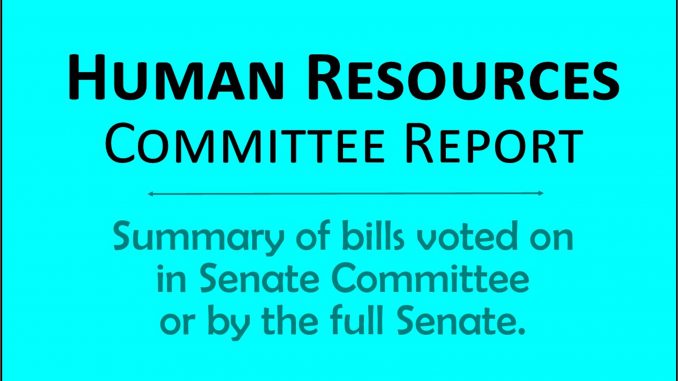
On this page
SF 296 – Pharmacists providing vaccines; Collaborative Pharmacy Practice
SF 296 allows pharmacists to administer an immunization or vaccination for COVID-19 to patients 18 and older. It also states that pharmacists may, in consultation with the Department of Public Health, order and administer the following to patients 6 and older:
- Point-of-care testing and treatment for the flu, strep A and COVID-19
- Point-of-care testing in response to a public health emergency
Pharmacy collaborative practice agreements (CPAs) are also permitted under this bill. CPAs create formal practice relationships between pharmacists and prescribers. They allow the prescriber (e.g., a physician or nurse practitioner) to delegate certain patient-care functions to the pharmacist with the intent of increasing access to care.
These agreements have been done in Iowa since the early 2000s, and this section of the bill would allow the Board of Pharmacy to change any administrative rules if needed. The bill also allows a health carrier to reimburse for the services provided under these agreements.
[4/28: 48-0 (Excused: Nunn, Schultz)]
SF 307 – State Medical Examiner child death autopsies and transportation costs
SF 307 requires counties to pay transportation costs both to and from the State Medical Examiner’s Office. Under the bill, an autopsy is not be required for a child death when the county medical examiner’s or State Medical Examiner’s investigation determines that the deceased child’s cause and manner of death are obvious, and there are no significant legal, medical or investigative concerns. The bill also makes some technical terminology changes.
[2/23: 48-0 (Excused: Nunn, Shipley)]
SF 524 – Inpatient psychiatric bed tracking study
SF 524 directs the Department of Human Services to convene a study committee during the 2021 interim to examine issues and develop policy recommendations relating to improvements in the inpatient psychiatric bed-tracking system, including expanding it to include the acuity of disabilities, behavioral disabilities, and sexually or physically aggressive behaviors; increasing reimbursement rates based on level of care; and implementing enhancements to the bed-tracking system. The bill prescribes the members of the interim committee and requires the Iowa Department of Human Services (DHS) to submit a report by December 15, 2021.
[3/10: 48-0 (Excused: Hogg, Nunn)]
HF 260 – Number of children in child care
HF 260 adjusts the number of children child care providers can have. The bill makes these adjustments:
- Child Care Homes. These homes are not registered with the state and are found in single-family residences. They currently can have five or fewer children at any time. If there are more than five children, the provider must register with the state. The bill continues to allow providers with five or fewer children to NOT register, and adds a provision that allows NO registration if the provider has six or fewer children and at least one of the children is school-aged.
- Child Development Homes. These homes are single-family residences as well, but they are registered with the state. They currently can have six or more children at any time. The bill changes that to allow for seven or more children at any time.
[3/29: 30-15 (Yes: Republicans, Bisignano, Kinney; Excused: Driscoll, Hogg, Kraayenbrink, Nunn, Sweeney)]
HF 302 – Child Care Assistance graduated eligibility phase out
HF 302 provides a graduated phase-out program for Child Care Assistance. This state-only funded program goes into effect after the Child Care Assistance Plus (CCA Plus) program benefits end, which is at 225% FPL. This new program will allow a family to remain eligible for child care assistance up to 250% FPL, or 275% for a family with a child or children needing special assistance. It sets up a sliding scale to determine the amount of child care the family will pay themselves, ranging from 33% to 60%. The program must be implemented by July 1, 2022.
[5/17: 45-0 (Goodwin, Johnson, Nunn, Schultz, Williams excused)]
HF 390 – Fluoridation disconnection notice
HF 390 requires an owner or operator of a public water supply system to give at least 90 days’ notice prior to taking any action to permanently discontinue fluoridation in its water supply. The notice must be placed on each customer’s water bill or provided in a way that is reasonably noticeable.
[4/6: 47-0 (Excused: Hogg, Nunn, Schultz)]
HF 835 – Iowa Achieving Better Life Experience (ABLE) Accounts
HF 835 makes these improvements to the Iowa ABLE (Iowa Achieving a Better Life Experience) Savings Plan Trust Accounts:
- Additional flexibility for those who have either a medical assistance special needs trust under 633C or a supplemental needs trust under 634A to transfer those funds to the Iowa ABLE Savings Plan Trust Account of the designated beneficiary.
- Greater flexibility and reduced burden on eligible individuals by expanding the list of those eligible to enter into a participation agreement and provide signature authority under Iowa Code 12I. These changes are in accordance with the IRS final regulations for ABLE programs.
- Even greater assurances to individuals and families with disabilities by prohibiting recovery of any account balance following the death of an individual who is a designated beneficiary of an ABLE savings account; the language would also allow flexibility for the designated beneficiary’s account to be transferred to an account for another eligible individual specified by the designated beneficiary or allow for the balance to be transferred to the estate of the designated beneficiary.
These changes will encourage more people to use pooled trusts without fear that their money will end up in state hands upon their passing, and thereby supporting the health, independence and quality of life of more individuals and families living with disabilities.
[4/21: 46-0 (Excused: Mathis, Nunn, Schultz, Whiting)]
